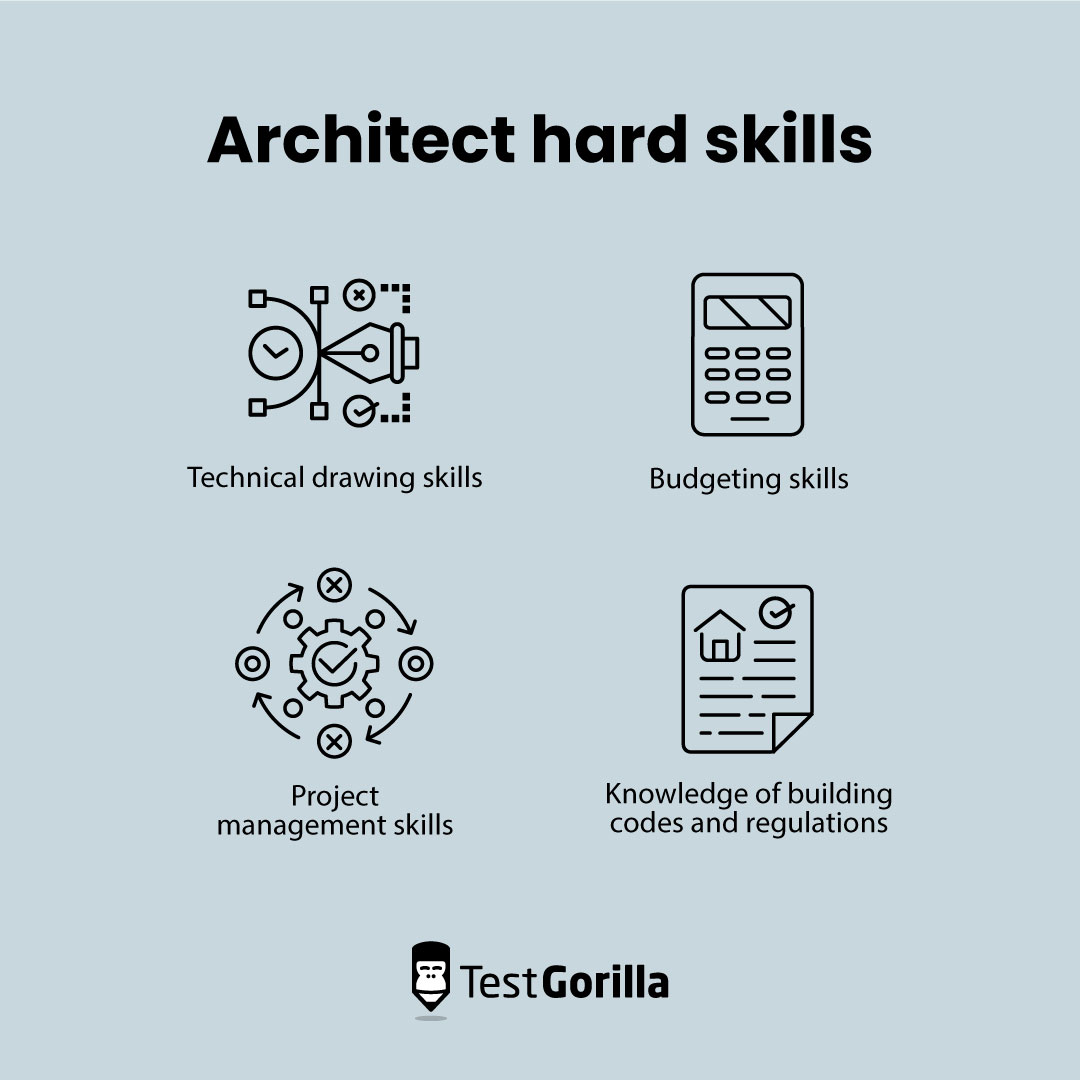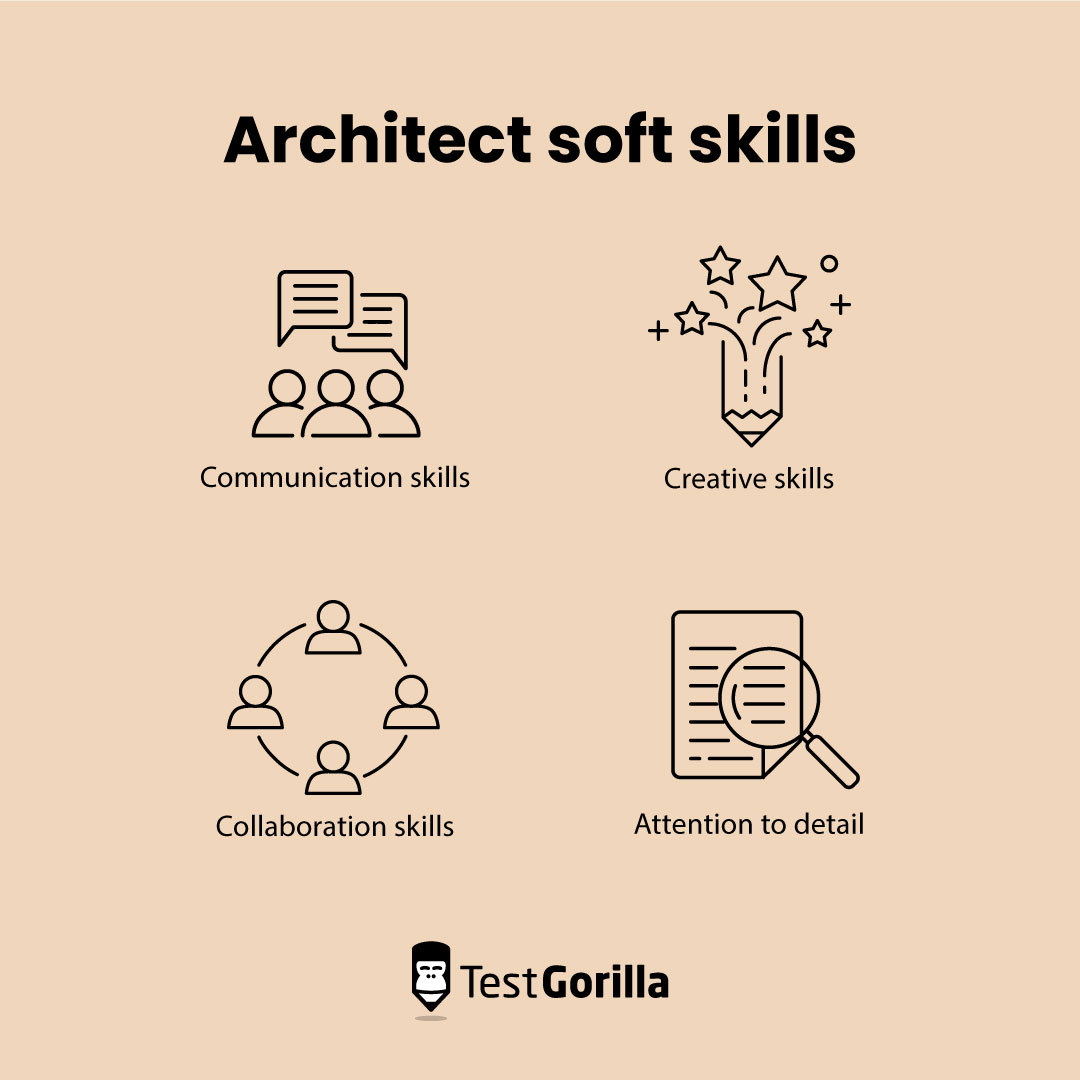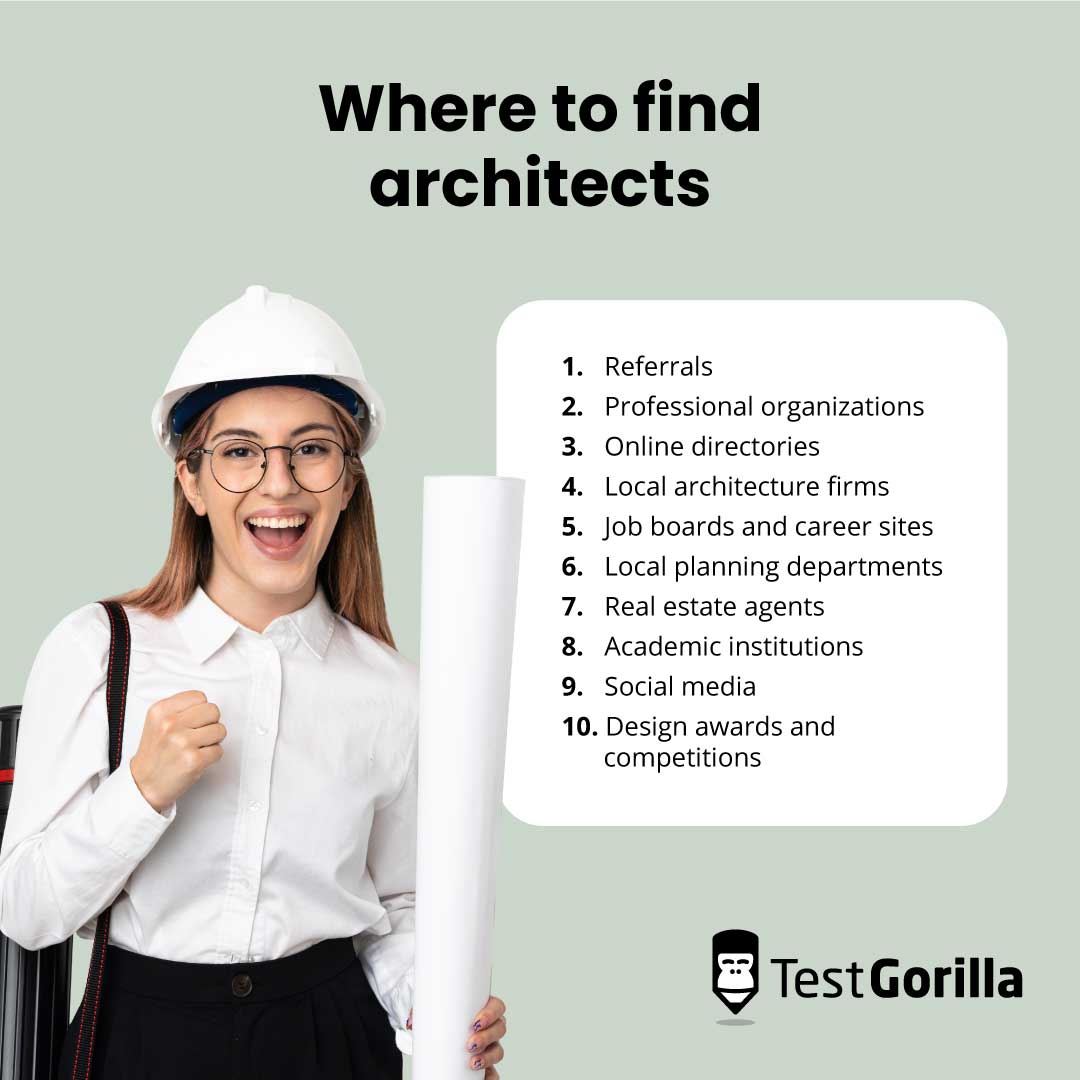Imagine entering a building that immediately impresses you. The construction design is not only functional but a stellar work of art. Now, imagine hiring an architect who can execute, on the same level, a visionary masterpiece for your project.
Before you can commission the design of your dreams and journey to the end result, how do you find an expert architect who can understand your vision? How do you confirm their expertise and creativity level? And where exactly do you begin?
Knowing the intricacies involved in hiring an architect is essential to finding the best person for the job. In this article, we’ll provide answers and insights to the questions you may have, including where to find architects and how to test and interview them.
Further, we’ll discuss their skills and responsibilities, and share a job description template that you can use when posting your job opening.
We’ll also introduce our AutoCAD test, which guarantees your candidates have the necessary technical software knowledge in the preliminary screening stage of your hiring process.
Table of contents
What is an architect?
An architect is a professional who plans and designs structures where people live, work, socialize, and learn. They are responsible for ensuring their designs are functional, safe, and aesthetically pleasing.
Architects work closely with clients, engineers, builders, and other professionals to create plans and oversee construction projects. They typically work in offices but may also spend time at construction sites.
Here are some roles of an architect in an organization or for a contract project:
Design buildings and structures. Their primary responsibility is to design safe buildings and structures that please clients. They consider environmental factors when designing to satisfy clients’ needs.
Prepare drawings and specifications. Architects prepare detailed drawings and specifications following an agreed-upon design. These documents give the builders and contractors vital information to construct the building or structure.
Oversee construction. Architects manage construction processes, certifying that the building follows set plans and specifications. They sometimes double as project managers and work with contractors and builders during construction.
Manage budgets and schedules. They make certain that the project stays within the client’s budget and required quality standards. They also manage construction schedules and guarantee the timely completion of the building.
Ensure sustainability. Architects consider the environmental impact of the building. They incorporate sustainable features such as energy-efficient heating and cooling systems, recycled materials, and green spaces.
Architect hard skills
There are a number of key technical skills to look out for in your architect candidates, which will indicate their level of expertise in the field. Here are some vital hard skills, along with examples of how they apply in an architect’s daily work activities:
1. Technical drawing skills
Technical drawing is an essential skill that one needs to master to even become an entry-level architect. It involves creating accurate and detailed drawings of buildings and structures.
Technical drawing is vital because it provides a detailed blueprint for construction, certifying that the constructed building follows a set plan. For example, an architect may use technical drawings to show the placement of windows, doors, and walls.
Some specialized software tools architects use are AutoCAD, SketchUp, and Revit. They also make pencil sketches of ideas and models that clients and stakeholders can clearly understand.
2. Knowledge of building codes and regulations
These are a set of rules and guidelines that dictate how to construct, maintain, and use buildings. For instance, the International Building Code (IBC) by the International Code Council sets minimum requirements for building safety, integrity, and accessibility.
Architects should have an in-depth knowledge of building codes and regulations. Also, they should guarantee that their designs comply with these standard codes. As such, they should be aware of updated changes by the IBC and implement them immediately.
3. Project management skills
Architects should be able to manage their time effectively, prioritize tasks, and delegate work to other team members. Project management skills can help them greatly in this case, especially if they need to manage multiple projects simultaneously.
For instance, an architect may be responsible for overseeing the construction of a new hospital. This would involve coordinating with contractors, engineers, and other stakeholders to perform the work.
4. Budgeting skills
It’s important architects have a solid understanding of budgeting and cost estimation. In addition, they need to develop accurate project cost estimates to ensure they complete the project within budget.
Architects should also be able to make decisions about materials, equipment, and labor based on cost considerations. For instance, an architect may use cheaper materials to reduce costs. However, they must certify that the materials are still of credible quality.
Architect soft skills
Besides having technical skills, architects require soft skills to use in their daily work activities with clients and colleagues. Here are some of the most critical soft skills every architect should have:
1. Communication skills
Architects need to interact well with clients, contractors, engineers, and stakeholders. As such, they should be able to explain their ideas concisely, listen actively to feedback, and negotiate clearly. The ability to communicate ideas at any instance is crucial.
Imagine dealing with a client who wants a floating skyscraper or a house completely made of glass. In the former, anti-gravity technology is yet to exist, while the latter seems unrealistic because glass, as the foundation of a house, can’t withstand external forces.
These projects are futuristic and not achievable yet, so the architect will need to explain to the client why such structures aren’t feasible or recommended according to present building guidelines. They must ensure the client understands the technicalities while proposing solutions.
In this process, they could also communicate alternatives that mirror the client’s desires. That way, every party feels satisfied.
2. Creative skills
Creativity is a critical soft skill for architects. They need to be able to think outside the box and come up with innovative solutions to design challenges. Architects should also be able to balance aesthetics with functionality, sustainability, and safety.
Say a client wants a building plan in which the functionality and aesthetics conflict, a creative architect should walk the line to achieve both. Here, only a creative and expert architect can develop a credible design solution.
For example, an architect may design a uniquely-shaped building with cantilevers that can maximize natural light and minimize energy usage.
3. Collaboration skills
Collaboration is essential for architects as they need to work with other experts, like contractors and clients. Architects should be able to listen to other people’s perspectives, compromise when necessary, and build strong relationships.
For example, architects may collaborate with engineers to ensure that a factory building’s structure is stable and meets safety standards. In this process, they should work together until they achieve the end result for the client.
4. Attention to detail
Architects require excellent visual attention to detail skills. This guarantees that their designs are accurate and precise, down to the smallest detail. Even a tiny error in a building’s design can have serious consequences.
Architects should have eyes for detail that could improve the function or appearance of the building.
For instance, a misplaced window could impact a building’s energy efficiency or aesthetic appeal. Attentive architects will scrutinize their designs repeatedly and ensure they make necessary changes before and during construction.
How to test architect skills
While architects should possess both technical and soft skills, screening hundreds of resumes to evaluate these skills can prove inefficient. It can also be time-consuming, stressful, and misleading.
One way to assess an architect’s suitability for a role is by administering a prescreening test. Pre-employment testing is a modern hiring technique that presents candidates with practical assessments to evaluate their skills.
Essentially, pre-employment tests help you make strategic hiring choices easier and faster. Using pre-employment tests also reduces biases by purely assessing candidates on their expertise level.
TestGorilla is a pre-employment assessment platform with several tests that you can administer to recruit the best architects. Here are some practical tests you can find in our test library which help assess an architect’s skills and abilities:
1. Technical skills test
One of the most critical skills for an architect is technical proficiency. A good recruitment test for an architect should evaluate their technical knowledge and skills. In this regard, you can use a technical assessment like our SolidWorks 3D CAD test.
This test includes questions on building codes, construction materials, engineering principles, and design software, in addition to practical tasks. Examples include drawing a plan for a simple building or analyzing a set of architectural drawings.
2. Problem-solving test
Architects should be able to solve complex problems and develop practical solutions. A Problem-solving test evaluates this ability by presenting candidates with real-world problems and asking them to come up with solutions.
This can include analyzing a set of drawings to identify errors or proposing a solution to a design challenge. It may also involve testing a candidate’s ability to handle demanding clients and devise solutions to their complaints.
3. Communication skills test
Great communication skills are essential for an architect to effectively relay their ideas to clients, contractors, and other stakeholders. Our reliable Communication skills test contains tasks that assess a candidate’s ability to communicate effectively.
The test focuses on understanding written communication, active listening, summarizing messages, and using professional communication etiquette.
This can include asking the candidate to present their design concept to a group of people. Another example is a written report summarizing a complex architectural project.
4. Collaborative skills test
Architects in organizations usually work in teams. As such, it’s essential that they have good collaborative skills. This can be tested through our Leadership and People Management test, which evaluates candidates’ ability to work effectively with others.
The test will help you hire architects with exceptional leadership abilities who can develop your business and support other members of your organization.
This can include asking the candidate to work on a group project. In addition, you can assess how they collaborate with other architects and other departments during a building project.
Learn more: How to assess architect skills
Where to find architects
When it comes to finding skilled architects, there are many options available. The first thing to consider and determine is the nature of the job. You might need an architect for a full-time role, contract project, or on a freelance basis.
Hiring for a full-time in-house role allows you to access the architect’s expertise as needed. When you already have experts on your team, you can undertake jobs faster. Although it may be costly when you consider remuneration, like work bonuses and extra incentives.
Hiring a freelance architect enables you to find new creatives for your projects. It’s usually a flexible arrangement and a good way to ascertain expertise in the event you want to move them to a full-time role. However, it may be challenging and time-consuming to find the best freelance architects.
Depending on your needs and requirements, you can explore various avenues to find the right expert for your project. Here are 10 options where you can find skilled architects for your work:
1. Referrals
One of the best ways to find a skilled architect is through word-of-mouth referrals from people you know and trust. Referrals are the closest and easiest means of finding a potential candidate for any role.
You can ask friends, family members, or colleagues who have recently undertaken a construction or renovation project for recommendations.
For example, they may connect you with an architect who performed excellently for them and could do the same for you.
2. Professional organizations
Organizations like the American Institute of Architects (AIA), the Royal Institute of British Architects (RIBA), and the International Union of Architects (UIA) are great resources for finding skilled architects.
These organizations often have directories or databases of their members. You can access this resource and search for architects who specialize in your specific type of project.
3. Online directories
Online directories like Architizer or Houzz allow you to search for architects by providing results based on location, project type, or specialty. These directories offer detailed profiles of architects, including their education, experience, and project portfolio.
This can allow you to filter your search effectively to find the best architect to employ in your business or for a construction project.
4. Local architecture firms
Consider visiting local architecture firms if you need a skilled architect in your immediate area. Many local firms offer free consultations or initial meetings, which allow you to discuss your project with them.
This can help you determine whether the firm has expert architects who can fit your needs and desired project well.
5. Job boards and career sites
If you want to find an architect to hire, you can consider posting an advertisement on job boards or career sites. This is applicable for both specific projects or hiring on a full-time basis.
Websites like Indeed or Glassdoor can help you reach a broad audience of qualified architects who are actively looking for work.
6. Local planning departments
Local planning departments are responsible for issuing permits for projects in their community. They also make sure construction projects comply with local building regulations and standards.
They often have a list of licensed architects available to work in the area. You can visit the department to provide you with contact information and other vital details.
7. Real estate agents
Real estate agents usually have a network of professionals they work with regarding housing and building infrastructure. A typical professional in every realtor’s contact list is an architect.
They may help you by recommending an effective architect who has worked with them on similar projects. With their strong network, they could be more likely to refer you to an architect with an exceptional reputation for delivering high-quality work.
8. Academic institutions
If a major need in your job search requires candidates to have fresh perspectives, you can visit credible academic institutions. These institutions have a pool of young and upcoming talents who can suit your needs.
Academic institutions like architecture schools and universities are a good place to start. They usually have job boards or career centers that connect students and recent graduates with employers or clients.
9. Social media
Social media platforms like LinkedIn, Instagram, or Twitter can be useful tools for finding expert architects. Many architects have a social media presence where they reveal their work and share their thoughts on architecture and design.
They also use these platforms to connect with potential clients or collaborators. You can select one or more social media platforms to optimize your search process.
Also, you can use hashtags, search filters, or direct messaging to find architects who match your criteria.
10. Design awards and competitions
Design awards like the Pritzker Prize, the AIA Awards, or the Architizer A+ Awards recognize excellence in architecture and design. These awards and competitions often feature winners and finalists who have achieved exceptional results in their field.
As such, they can be a great source of inspiration for talents. You can attend the events with an open mind, remembering to connect with people. While you can find candidates for your work, you can also use this opportunity to expand your professional network.
Architect job description template
Job descriptions provide clear outlines of a job’s requirements, duties, remuneration, and qualifications. Using a job description template can help you save time by making accurate job postings and attracting the best talent for the job.
Here’s a good example of a job description template that you can use when hiring an architect for your company or project:
[JOB TITLE]: This line should clearly state the position being advertised, such as “Architect” or “Senior Architect.”
[LOCATION]: This should specify the location of the position, including the city and state.
Reports to: [Insert Manager/Supervisor title]
[COMPANY INFORMATION]: This section should provide information about the company, including its mission, culture, and values.
“We are a leading architecture firm that specializes in commercial architecture and sustainable design. We’ve been in business for 11 years, and we have a mission to create innovative designs through eco-friendly designs.”
[SUMMARY]: This should provide a brief overview of the position and its responsibilities.
“We are seeking a professional architect for our organization. The architect will be responsible for providing 3D models and managing the project from the design stage.”
[RESPONSIBILITIES]: This should outline the specific duties and responsibilities of the position. Here are some examples:
Designing and planning construction projects
Managing project budgets and timelines
Collaborating with clients and other professionals
Creating 2D and 3D models and sketches
Providing eco-friendly and energy-conserving designs in line with the IBC
[REQUIREMENTS]: This should list the required qualifications for the position, such as a degree in architecture, professional licensure, and proficiency in design software. Consider the following:
Bachelor’s or master’s degree in architecture
Proficient in technical design software
Excellent communication skills, both verbal and written
Strong organizational and time-management skills
5-7 years of experience in architectural design and construction management
Ability to work independently and as part of a team
[WORKING CONDITIONS]: These are the environmental circumstances in which the architect will work. It usually contains physical work environments, work hours, travel requirements, and other factors peculiar to the nature of employment.
“The architect will work in an office environment and may need to work some evenings and weekends. They may also visit sites outside work hours and travel to meet clients.”
[SALARY AND BENEFITS]
[Insert salary range and benefits package information]
“We value creativity, initiative, and attentiveness. We also commit ourselves to provide a friendly work atmosphere that allows all employees to stay motivated and productive.”
How much does an architect cost?
There is high demand for experienced architects in the United States alongside other developing and developed countries.
According to the Bureau of Labor Statistics, the average architect’s yearly salary in the United States is $80,180. In some regions, architects may earn up to $120,000 yearly.
Discussing fees and payment structures with potential employees before hiring them is essential so both parties are clear on remuneration terms. The cost of hiring an architect differs widely depending on several variables, including:
Project scope. The complexity and size of the project can impact the architect’s fees. Bigger and more complex projects will require more time and resources. In that case, they are usually more expensive.
Level of experience. Architects with more years of experience typically charge higher fees than starting or junior architects.
Location. The cost of living and the local market for architectural services can impact the fees they charge. In areas with a high cost of living or a high demand for architectural services, fees can be higher.
Services required. Some architects may charge additional fees for services beyond essential design work. Examples of extra services are project management and construction administration.
Architect interview questions
A good way to identify the best candidates in the hiring process is by asking the right questions. You should take time to get to know your potential architect by preparing useful interview questions. This can help you learn more about their skills and experience.
Before commencing anything at this stage, it’s advisable you learn how to conduct an interview. Your interview could either be conducted virtually or in-person, depending on your preference. Let’s discuss both briefly.
Virtual interviews
You can conduct virtual interviews to screen candidates using a prescreening test. Virtual interviews allow you to evaluate candidates on conditions that usually don’t require meeting with them physically.
Virtual interviews can be done via phone call or a video meeting. Regardless, remember to stay in a quiet and calm environment. Here are five questions to ask an architect before hiring:
What inspired you to pursue a career in architecture, and what do you enjoy most about the profession?
How do you stay up-to-date with the latest design trends and technologies in the field?
Can you describe a challenging design problem you faced on a project and how you solved it?
Can you give an example of a successful project you completed and what made it successful?
Can you discuss your experience working with contractors and the construction team?
Physical interviews
The traditional in-person interview process is another option for assessing candidates in-depth. You can conduct this interview independently or after screening successful candidates from the virtual interview.
This interview allows you to ask more personal questions that can help you select your candidate. When interviewing architects, ask questions that assess their hard and soft skills, as well as their experience and qualifications. Some sample physical interview questions include:
Can you walk us through your design process, from the initial concept to the final product?
How do you manage multiple projects and prioritize competing demands on your time?
Can you describe a time when you had to communicate a complex design idea to a non-technical client or stakeholder?
How do you make certain that your designs meet all relevant building codes and regulations?
How do you approach sustainability and environmental considerations in your plans?
Incorporating pre-employment tests into your hiring process
Architects play a critical role in design and construction, and finding the right architect for a project can be a challenging but essential task. Therefore, combining traditional interviews with pre-employment tests allows you to make more informed hiring decisions and hire better.
Rather than relying on resumes and cover letters, you can personally analyze your candidates’ skills using an array of credible tests to see if they fit your needs.
With the right approach and combination of pre-employment tests, finding and hiring a qualified architect can be smooth and successful. Create a free account with TestGorilla today so you can enjoy a whole new and enjoyable hiring experience.
Related posts
Hire the best candidates with TestGorilla
Create pre-employment assessments in minutes to screen candidates, save time, and hire the best talent.
Latest posts
The best advice in pre-employment testing, in your inbox.
No spam. Unsubscribe at any time.

Hire the best. No bias. No stress.
Our screening tests identify the best candidates and make your hiring decisions faster, easier, and bias-free.
Free resources
This checklist covers key features you should look for when choosing a skills testing platform
This resource will help you develop an onboarding checklist for new hires.
How to assess your candidates' attention to detail.
Learn how to get human resources certified through HRCI or SHRM.
Learn how you can improve the level of talent at your company.
Learn how CapitalT reduced hiring bias with online skills assessments.
Learn how to make the resume process more efficient and more effective.
Improve your hiring strategy with these 7 critical recruitment metrics.
Learn how Sukhi decreased time spent reviewing resumes by 83%!
Hire more efficiently with these hacks that 99% of recruiters aren't using.
Make a business case for diversity and inclusion initiatives with this data.




















